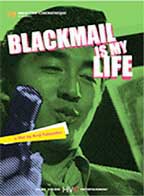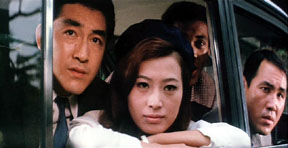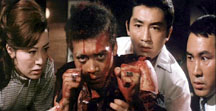
 BLACKMAIL IS MY LIFE
BLACKMAIL IS MY LIFEAlso Known As
Kyokatsu Koso Waga Jinsei
Blackmail Is My Business
Call Me Blackmail!
Directed by Kinji Fukasaku
Japan/1968 – 90 Minutes/Widescreen
DVD Provided by Home Vision Entertainment
Article written by Mark Engle
“Just as a happy ending does in American movies. It’s understandable and expected from a box-office perspective. And in reality, when I look back the American style in film has been spreading throughout the world. However, at the same time, there’s this to consider: A human being’s life cannot be depicted as having a happy ending. That’s the present situation the film industry is in. That’s the industry’s biggest challenge: how to portray human lives.” – Kinji Fukasaku 1930 – 2003.
Kinji Fukasaku’s words of wisdom definitely resonate when experiencing one of his many films. In the quote above, he is specifically relating to his 1968, there are no winners, BLACKMAIL IS MY LIFE. A fun look at Pop Culture crime that goes awry, it’s set in a time when the young discovered the true evils of their everyday surroundings. With a surf-mod soundtrack, fast cars, hot dames and a major dose of naivety, director Fukasaku brings a bitch slap to the age of innocence. Set in 1968, this picture tracks the rise to ruin tale of four young “punks” finding a free and fun lifestyle of blackmailing their elders. Despite that it’s now 2004 and today’s viewers can easily see where the movie is going from the start, the story will help the audience remember the day everyone crosses that threshold where adults can’t be trusted, people get hurt and life is never fair, no matter how hard anyone tries. The film still works and is a testament to Fukasaku’s ability to visually tell a story worth repeating.
The story centers on Shun (played by the charismatic Hiroki Matsukata), one of four young people who spend their time framing and extorting gangland grifters and conmen. Not a bad plan if those you are scamming from don’t catch you. What are they going to do? Run to the police? We flashback to Shun’s past as he is dumped by the girl he is freeloading off of, gets beaten up after overhearing two thugs talk about milking fake Scotch into a drinking establishment for extra gain, and then comes up with the idea of how to turn the tables. Teaming up with three buddies, they then spend their time making a living at blackmail, buying fast cars, turning a bad deed into a fast buck and living hard. That is until they set their sights a little higher. Always looking for an edge, Shun finds out about a document that implicates an important politician is tied in with an extremely powerful crime lord and corrupt businessman. Shun may be able to thwart and rob the pimps, drug pushers and local small time yakuza, but now he and his team are taking on the government and big industry. This isn’t small time thievery, but massive corruption on a level that they may not be able to survive.
Many fans know of Kinji Fukasaku, especially with his last film before his untimely death, BATTLE ROYALE. The sad thing is, Fukasaku had been directing films for over 40 years and managed to put out several very worthwhile titles, but unfortunately, many have been mistreated in the US or gone unseen by many genre fans. His range went from whacked out science fiction to serious social commentaries on the human psyche, all with the intent to reach his audience while entertaining them. Basically stated, the only movie like BATTLE ROYALE from Fukasaku is BATTLE ROYALE. Most of his projects being released on DVD today are smart in linking the director to his last phenomenal hit, but many viewers may be disappointed with the fact that not one story is alike in style, violence or mayhem. They all deal with different levels of emotion, and while BLACKMAIL IS MY LIFE is a prime example of the man’s talent at work, it’s nevertheless a truly different story. What all his films have in common is a manic and understated storytelling device that will give the viewer entertainment and show some sort of exciting adventure that, unbeknownst to the viewer, will create emotions and a sense of caring for the leads regardless the outcome. That is directing, and Fukasaku’s talent outweighed just one hit film.
Home Vision Entertain manages to release BLACKMAIL
with the respect that it deserves. With a new digital DVD transfer and
new subtitles, the picture quality is near perfect and the original mono
soundtrack sounds full despite its age. To round out the extras, we get
a two-page liner note essay from Patrick Macias, who also wrote TOKYOSCOPE:
THE JAPANESE CULT FILM COMPANION, and an interesting 18-minute
interview with Kinji Fukasaku plus his filmography. The interview itself
talks about his personal beliefs at the time of filming, along with his
opinions on the two diverse studios he worked for during that time period.
It doesn’t dig very deep into the machine behind the mayhem of BLACKMAIL
IS MY LIFE, but it does give you a personal extension of the
man’s belief behind the picture as well as his own cynical, yet
entertaining outtake on life and cinema. Overall, the movie may not be
as epic as Fukasaku’s VIRUS, as cynically depressing
as BATTLE ROYALE, as emotional as THE YAKUZA
PAPERS, or as wild as THE GREEN SLIME, but it
is a prime example of a director connecting personally with his audience.
For that, I can easily recommend i
 |
 |
 |